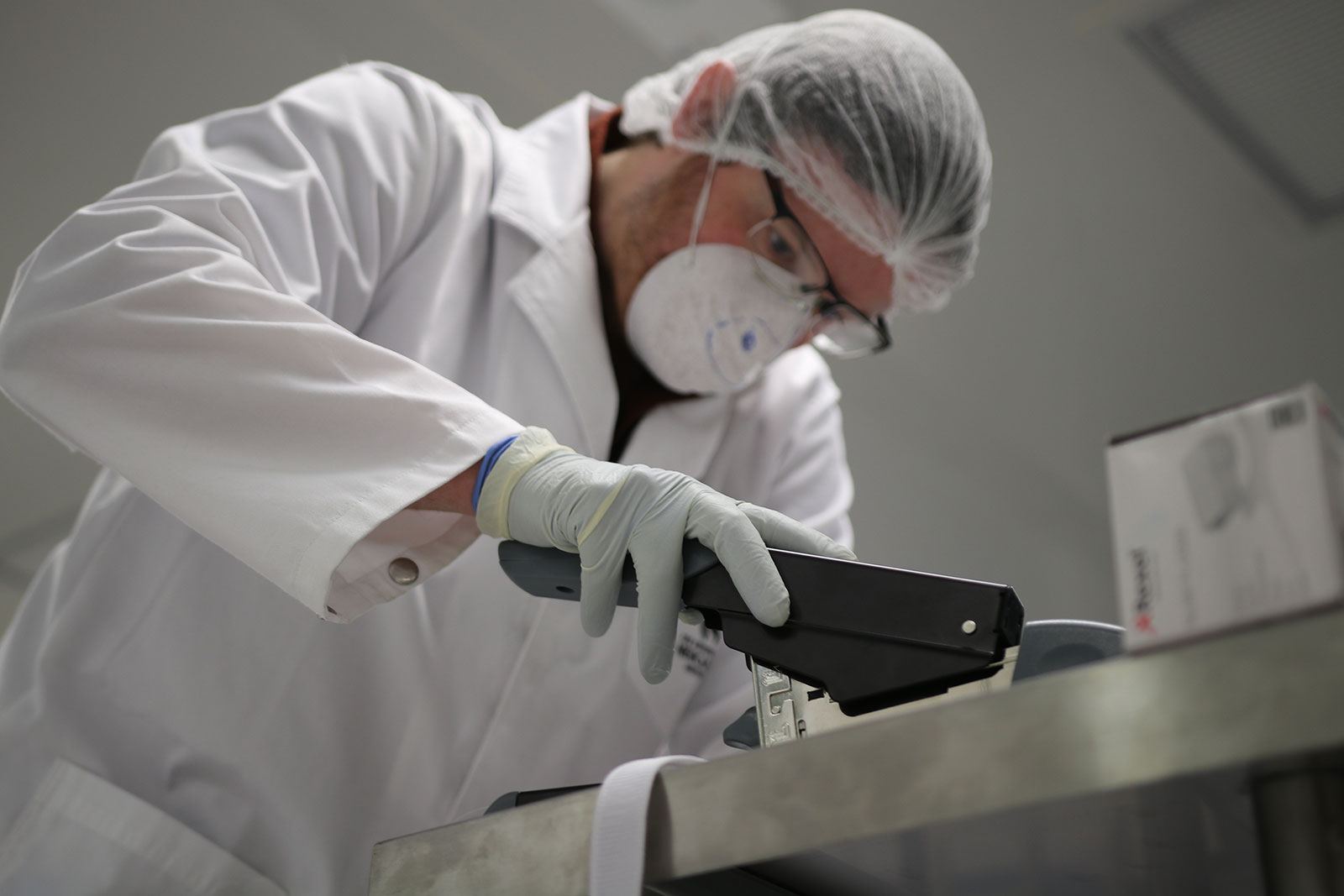University news
Menu
University minds meld to address COVID-19 equipment shortages
At a time when social distancing and isolation are keeping people apart, innovative teams at the University of Newcastle have come together to address a key health concern amidst the COVID-19 outbreak – the rapid production of desperately needed medical equipment.
Around the world, there are dire shortages of medical-grade resources to treat COVID-19 patients, with personal protective equipment (PPE), ventilators and respirators in notably short supply.
Playing a pivotal role as liaison between health professionals and the University, acting Pro Vice-Chancellor Faculty of Health and Medicine, Professor Liz Sullivan, said a key working group* from a range of disciplines had shown exceptional initiative in aiding these shortages.
Hundreds of critically needed face shields are being produced for those on the front line flighting COVID-19.
“Providing our medical and health workers with the resources they need to do their jobs safely is of paramount importance. We hope to play a part in ensuring their safety, and potentially the safety of the wider community,” Professor Sullivan said.
This is a truly collaborative effort. I’m proud to be part of a team who mobilised to ascertain our capabilities and who are working tirelessly to deliver viable products."
Pro Vice-Chancellor Faculty of Engineering and Built Environment, Professor Brett Ninness, said the incredible minds involved had led to the conceptualisation and development of a range of projects.
“As scientists and engineers, our responsibility is to try and solve some of the world’s greatest challenges, and right now, COVID-19 is it,” he said.
“From face shields; to 3D printed equipment; to novel tests for COVID-19; and the repurposing of existing drugs, the activities underway across our institution are incredible.”

As a result of the efforts, critical face shields have already been delivered where they’re needed most. A product of physicists, engineers, designers and health workers working together, the face shields are made from a piece of PET plastic held in place by an elastic headband.
“The chosen design is simple and fast to assemble, so we’re able to generate hundreds a day which are already being distributed in our region and beyond,” said Professor Paul Dastoor, Director of the Centre for Organic Electronics (COE) within the Faculty of Science – the team responsible for manufacturing the face shields.
While the COE team are well-versed in the development and production of advanced medical devices, the rapid manufacture of medical PPE was not business as usual for them.
“We had stocks of PET available to us for use in the production of our printed solar panels,” Professor Dastoor said.
“As a result of the scoping work done by our colleagues, we were able to tap into the collective expertise of the University, connecting with fellow researchers to arrive at a prototype we knew we could manufacture rapidly.
“Industry partners were also quick to support the cause, with Guru Labels on the Central Coast laser cutting the PET in bulk and the Australian National Fabrication Facility team based at the University contributing to the build of the shield assembly line.
The beauty of this kind of effort is, now we have a model we know addresses the needs of those on the ground, we’ve been able to collaborate to make the production process even faster. There’s truly a community rallying together contribute what they can in this crisis.”

Finished face shield

Foam is attached to face shield

Design for laser cutting

Dr Nic Nicolaidis tests laser cutter
The indiscriminate nature of COVID-19 means the University’s initiatives have the potential to make a difference not only locally but nationally and even internationally.
Vice-Chancellor and President, Professor Alex Zelinsky AO, said the collaborative efforts in this early response COVID-19 phase are indicative of the important role the University will play in addressing this global challenge.
“The global COVID-19 pandemic is testing every aspect of society. As a University that is home to great minds and world-leading innovators, we know we are part of the solution,” Professor Zelinsky said.
“Now more than ever, we are focused on serving our communities and we will bring all of our expertise across different fields together to do that.
“It is a challenging time, but tackling global challenges is what we are here to do.”
*The mobilising team comprises Professor Andrew Fleming, Dr Ben Vaughan, Professor Liz Sullivan, Professor Chris Dayas, Miss Priscilla Tan, Professor Rohan Walker, Professor Sarah Johnson, Professor Frances Kay-Lambkin, Mr Dan Conway, Professor Brett Ninness, Professor Lee Smith, Professor Juanita Todd and Ms Elaine Terry.
The University of Newcastle acknowledges the traditional custodians of the lands within our footprint areas: Awabakal, Darkinjung, Biripai, Worimi, Wonnarua, and Eora Nations. We also pay respect to the wisdom of our Elders past and present.